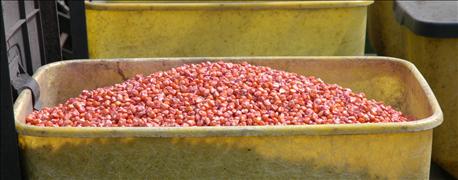March 13, 2016

Seed is perhaps the one input that you can’t afford to make any mistakes with.
Ken Bertsch, North Dakota’s state seed commissioner, says the four biggest seed purchasing mistakes he sees are:
1 -- Not paying close attention to the seed label. Germination, purity and seed count all contribute to the final stand count, which is important in today’s precision planting environment. Know each variety’s optimum plant population and how the label claim, especially in regard to germination and seed count, will equate to viable plant populations.

A planter box is filled with corn seed.
2 -- Failing to have bin-run seed tested at an accredited laboratory for germination, purity and seed health issues. Trained seed analysts can determine seed viability; what may look like a germinating seed in a home germ test may not produce a viable seedling under field conditions. Analysts also can identify the presence of weed seed, including perennial or noxious types, present in the sample.
3 -- Not buying seed from a reliable retailer. North Dakota seed law requires sellers to be licensed by the State Seed Department to label and market seed in the state. “We’ve identified what could be considered roving seed dealers operating in North Dakota,” Bertsch says. “These individuals or companies should be treated with caution and reported to the State seed Department, where we can determine labeling compliance and whether seed is being marketed legally.”
4 -- Ignoring plant variety protection laws. Nearly every seed source is protected by the variety owner under the Plant Variety Protection Act or a plant patent. The use of on-farm seed is legal in some cases, most often related to cereal crops. That use only applies if the seed has been acquired legally, meaning the farmer replants only the seed he purchased in a previous planting season. “There is virtually no scenario where a farmer-to-farmer transfer of non-certified seed, commonly called brown-bagging, is legal under variety protection laws,” Bertsch says. Certified Seed Only agreements, or CSOs, also are becoming more common in the industry. These contracts restrict the replanting of seed in a subsequent year, and violation of the agreement may be subject to civil action. North Dakota state seed laws provide for a maximum penalty of up to $10,000 for each violation of the PVPA. These provisions can affect the seller, purchaser and conditioner involved in illegal use of protected seed varieties. Variety owners, including public institutions such as North Dakota State University, also are able to file civil actions and obtain triple damages on seed sold and grain produced from the seed planted illegally. Violation of the PVPA and/or variety owner intellectual property rights can result in enforcement penalties and legal costs to the violator.
For more information about seed law, contact the North Dakota State Seed Department at (701) 231-5400. State seed laws may be found in North Dakota Century Code Chapter 4.1-53 or at http://www.legis.nd.gov/cencode/t04-1c53.pdf?20160303135438
North Dakota State University Extension Communications contributed to this article.
You May Also Like




